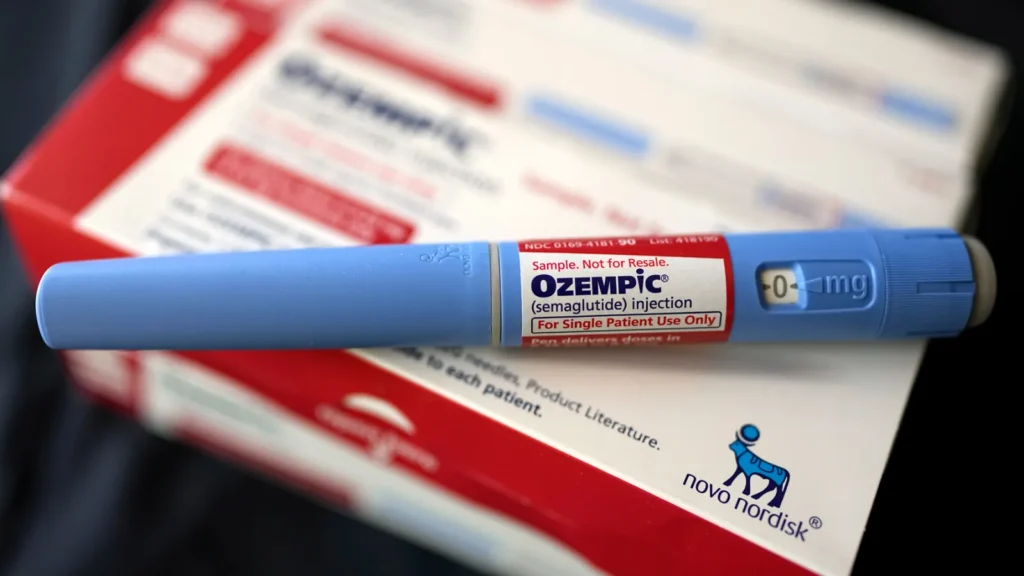Ozempic (Semaglutide)
Ozempic (Semaglutide)
Semaglutide
Product information
Ozempic Offer: Purchase 2 or more Ozempic pens and receive 10% off your purchase (up to $100 off). Use coupon code "Ozem10" at checkout or contact us after placing an order.
In stock and ready to ship.
RX Required

Product options
Ozempic (Semaglutide)
Ozempic, a brand name for Semaglutide, is used to treat type 2 diabetes. It falls under the category of Glucagon-like Peptide-1 (GLP-1) Agonists. Ozempic is used with diet and exercise to improve blood sugar control and reduce the risk of heart-related issues like death, stroke, and heart attack. Besides lowering blood sugar, Ozempic helps with weight loss, reducing appetite, and lowering blood pressure.
Key Information:
- Ozempic is not insulin.
- It is not meant for treating type 1 diabetes.
- It hasn’t been studied in people with pancreatitis and shouldn’t be used by those with a history of the condition.
- Its safety and effectiveness for people under 18 years old are unknown.
USA Patients: Buy Ozempic for a Lower Price
Save big on Ozempic at Buyinsulin.com, your go-to import source for lower prices compared to the U.S. retail cost. Your purchase is shipped to your door from Winnipeg, Manitoba – a North American logistics hub. Our customer service team is available 24/7 via phone, chat, and email to answer any questions you may have.
How to use Ozempic?
Ozempic can be used alone or with other medications, administered as a weekly injection under the skin, and is available as a safe and easy-to-use single-use injection pen.
Patient Guidelines
Doctors should inform patients about the risks and benefits of using Ozempic. Patients need to maintain a proper diet, exercise regularly, monitor glucose levels, and perform A1c testing. They should also understand the signs of hyperglycemia and hypoglycemia. If patients experience stress, fever, infection, trauma, or surgery while using Ozempic, they should seek medical advice as their dosage may need adjustment.
Understanding the side effects of Ozempic, such as nausea, vomiting, and diarrhea, is crucial and should be discussed with your doctor or pharmacist, along with any potential drug interactions. If a dose is missed, it should be taken within 5 days; otherwise, skip it and continue with the next scheduled dose, then resume the regular weekly dosing schedule.
Keep in mind when administering Ozempic:
- Don’t inject in the same spot every time. Rotate injection sites.
- Avoid injecting into areas where the skin is thick, has pits or lumps, as this can affect how well the medication works.
- Don’t inject into bruised, scaly, hard, tender, or damaged skin.
Where to store Ozempic?
Refrigerated! If you have extra Ozempic injectable pens, store them in the refrigerator, ideally on the top shelf and away from cooling elements. Extreme cold can degrade semaglutide, reducing its effectiveness and potentially raising blood sugar levels.
Ozempic should be kept between 36-47°F (2-8°C) in the refrigerator. After use, it can be stored at room temperature (59-86°F or 5-30°C) for up to 56 days.
Side Effects
Even though Ozempic is FDA approved and safe when used as directed, it can still have side effects. Before starting Ozempic, talk to your doctor or pharmacist about possible side effects and review the FDA-approved labeling and instructions that come with your prescription. Ozempic has a boxed warning about the risk of C-cell tumors found in rodents. While the effects on humans are unknown, it is not recommended for those with a family history of thyroid cancer.
Common Side Effects
- Nausea
- Vomiting
- Diarrhea
- Abdominal pain
- Constipation
- Upset Stomach
- Flatulence (passing gas)
Serious Side Effects:
Serious side effects from Ozempic are rare. If you experience any, inform your doctor immediately or call 911 if the symptoms are life-threatening. Please see the table below for the detailed possible serious side effects.
| Serious Side Effects | Symptoms |
|---|---|
| Pancreatitis | Severe back and abdominal pain, Nausea, Vomiting, Unintended weight loss, Fever, Swollen belly |
| Hypoglycemia | Confusion, Dizziness, Drowsiness, Fast heart rate, Feeling jittery, Headache, Hunger, Irritability, Sweating, Weakness |
| Diabetic Retinopathy | Blurred vision, Poor night vision, Seeing dark spots, Vision loss |
| Kidney Damage | Confusion, Fatigue, Reduced urination, Nausea, Swelling in legs or ankles |
| Thyroid Cancer | No specific symptoms listed |
| Allergic Reaction | No specific symptoms listed |
Side Effect Details
Here is more information on possible side effects that can happen with this medication.
- Allergic Reaction: Although rare, some patients may have allergic reactions to Ozempic. Symptoms can include skin rash, itchiness, flushing (redness, warmth, swelling of skin). More serious reactions may include difficulty breathing, swelling of the skin, especially lips, eyelids, hands, or feet, and swelling of the mouth, tongue, or throat. If you think you are having a severe allergic reaction, seek medical help immediately.
- Nausea: Nausea is the most common side effect. It may occur when you start taking Ozempic or increase the dose. Symptoms usually decrease or go away with continued use. If they don’t, talk to your doctor.
- Thyroid Cancer: Ozempic has a boxed warning about the risk of thyroid cancer. It has been found to increase thyroid tumors in animal studies, but this hasn’t been confirmed in humans. If you have a family history of thyroid cancer, you should not take Ozempic. Symptoms of thyroid tumors include difficulty breathing, a hoarse voice, difficulty swallowing, and a mass or lump in your neck.
- Injection Site Reactions: Some patients may experience discomfort or redness at the injection site.
- Increase in Amylase and Lipase: Patients may experience an increase in amylase and lipase levels.
- Cholelithiasis: Some patients may develop gallstones.
- Increased Heart Rate: Patients may experience a slight increase in heart rate.
- Dizziness, Dysgeusia & Fatigue: Less than 0.4% of patients may experience dizziness, changes in taste, or fatigue.
- Immunogenicity: Patients may develop antibodies to semaglutide.